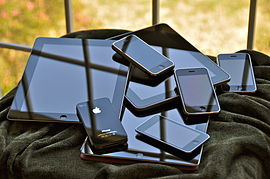This article needs to be updated. (August 2021) |

The post-PC era was a market trend observed during the late 2000s and early 2010s involving a decline in the sales of personal computers (PCs) in favor of post-PC devices; which include mobile devices such as smartphones and tablet computers as well as other mobile computers such as wearable and ubiquitous ones. These devices emphasize portability and connectivity, including the use of cloud-based services, more focused "apps" to perform tasks, and the ability to synchronize information between multiple devices seamlessly.
The term was first coined by MIT scientist David D. Clark. While both Microsoft's and Apple's former CEOs Bill Gates and Steve Jobs also predicted a shift towards mobile devices as the primary method of computing, as a complement to the PC, Jobs popularized the term "post-PC" in 2007 (the launch of the first iPhone), and in 2011 launched iCloud, a service enabling Apple's product line to synchronize data with PCs through cloud services, freeing their iOS devices from dependency on a PC.
Towards the middle of the 2010s, media sources began to question the existence of the post-PC era, at least as conventionally defined, stating that the so-called post-PC devices are just other portable forms of PCs joining traditional desktop PCs which still have their own operation areas and evolve.[1][2][3][4][5] For example, gaming PCs are often considered still popular for many users.[6][7]
- ^ "Why the Much-Hyped Post-PC Era Never Arrived". eweek.com.
- ^ tomwarren (9 August 2015). "There's no such thing as post-PC". The Verge. Vox Media.
- ^ Darren Orf (11 August 2014). "So What Ever Happened to Post-PC?". Gizmodo. Gawker Media.
- ^ "The 'Post-PC Era' Never Really Happened…and Likely Won't". Tech.pinions. 6 September 2018. Retrieved 2020-10-02.
- ^ Epps, Sarah Rotman. "The Post-PC Era: It's Real, But It Doesn't Mean What You Think". Forbes. Retrieved 2020-10-02.
- ^ Torres, JC (2015-08-20). "Forget post-PC: are we already in a post-Desktop era?". SlashGear. Retrieved 2020-10-02.
- ^ Kingsley-Hughes, Adrian. "What will the PC look like in the post-PC era?". ZDNet. Retrieved 2020-10-02.